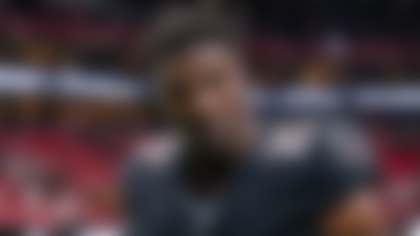BALTIMORE -- Four days before his life's plan crumbled to the ground and had to be helped away, Steve Smith Sr. was explaining why he was going to retire.
There were those around Smith -- his own family, members of the Baltimore Ravens -- who thought Smith might waver then, who hoped Smith would waver, because his production and his personality were still contributing to a team with a relatively young locker room. The formidable chip -- it was big, even as he is diminutive -- that had been lodged on his shoulder since at least college was still firmly in place, having famously spurred him to fights and poetic put-downs, to say nothing of two first-team All-Pro nods and five Pro Bowls. It was hard to imagine how that rage might be channeled when Smith was talking about the placid pursuits he was anticipating, the books he planned to read, the charity work he looked forward to continuing, the exotic trips he longed to take with his family.
But on that rainy morning late last October at the Ravens' posh training facility in the Baltimore suburbs, Smith was adamant that he had thought it through carefully, had reflected, in particular, on what he felt watching the New England Patriots win Super Bowl XLIX, and was certain that the impending retirement he had announced before the 2015 season was the correct decision.
"At some point, it's going to be taken away," he said. "I don't want to -- and I can't -- play to the point where you see people saying, 'He needs to. It's about that time.' Last year was the first year watching the Super Bowl that I was just kind of watching it, not like, Oh man, that should be me, or, That should be our team. Especially with us playing New England [in the Divisional Round that year] and how close it was. I wasn't like, That was our game to lose. I watched it as a fan. It was over, I turned it off, texted [Patriots receiver and former Panthers teammate] Brandon LaFell congratulations and went to sleep like everyone else.
"It has nothing to do with being engaged, but being able to enjoy the game without feeling like I'll miss it. If this was five years ago, I would feel like, Oh man, this is something that is going to be really hard. I don't think it's going to be as hard because of the way it's going."
The Sunday immediately following that conversation, it went a very different way.
In the third quarter of the Ravens' eighth game last season, on the 961st regular-season reception of his career, Smith caught a pass in traffic from Joe Flacco, darted left, kept going upfield for a first down and more and was tackled by his right ankle. He instinctively tapped the back of his foot and raised his right hand to alert the sideline that something was wrong. Then he rolled over, his facemask pressed into the edge of the Ravens' logo near midfield, and began smacking the turf with the palms of his hands. His Achilles tendon was shredded -- "exploded" was the word doctors used when they told Smith that his was a particularly severe injury, because the tendon tore in two spots, off the bone and in the middle of the tendon. His season -- and presumably, because of his plans, his career -- was over.
No less a sports psychologist than Bill Parcells believed that once a player thought about retiring, he already was. But Smith had been defying expectations and using slights as fuel since he was an undersized receiver and returner from the lightly regarded University of Utah. So from the moment he was helped from the field that Sunday, his head wrapped in a towel to conceal his agony, his plan to retire seemed to everyone else even more unfathomable -- even more wrong -- than it had before.
When Smith was at the Pro Bowl after his rookie year, he had dinner with his agent and told him he would be lucky if he played eight years. He knew players of his stature -- 5-foot-9 and "170 after Thanksgiving" -- wore down, particularly ones like him, who fought for every yard and didn't go down quickly after a catch.
Smith lettered in football and track at his Los Angeles high school, working all the while at a nearby Taco Bell, but he was not highly recruited because of his size and perceived anger issues. So he began his college career at tiny Santa Monica College, where his teammate was Chad Johnson. After two years at the community college, he went to Utah. He was wrapping up a record-breaking first season there -- he set school marks in punt return yards (495) and punt return touchdowns (three) in a single season -- when he suffered a broken vertebra on a punt return. He finished the game before the injury was discovered and was given just a 50-50 chance of playing football again, according to an article on the Ravens' website. He returned the very next season and led the Utes in receiving yards, receiving touchdowns and total return yards.
The broken neck, the lack of height, the fact that scouts said he wasn't a polished route runner -- Smith remembers all of that as a smear campaign. When he was drafted by the Carolina Panthers in the third round, he was supposed to be just a returner. He spent 13 seasons there before being released, a fact that still clearly rankles him; he's happy to talk about his close relationship with owner Jerry Richardson, whom he called to tell of his retirement plan before he announced it, but little else about the Panthers. When the Ravens signed him, the question was how much the 30-something receiver had left, which Smith remembers with a sneer becoming a smile.
It turns out he had plenty left -- he had more than 1,000 receiving yards in his first season with the Ravens. By the time he was hurt last year, Smith was in his 15th season (one of them, in 2004, lasted just one game before he suffered a season-ending broken leg). An undrafted rookie had approached him last summer and asked Smith to tell him how he had lasted so long in the league. He had been lucky, Smith told the rookie. He didn't have the workload at 22 that he had at 36. He hated being thrown to just five times in some games when he was young despite running an abundance of routes in practice -- he once read a study that said receivers run 1,000 routes in practice each year. He argued with coaches about it. Now, Smith realized it was a blessing, because it had extended his career. Last season, before he was hurt, Smith was being targeted an average of 10 times per game.
Ravens running back Justin Forsett was trying to convince Smith not to retire even before the injury happened. He is close with Smith -- yes, Smith and the 5-8 Forsett have bonded over their height -- and saw how Smith worked to maintain his body. He put ice on at night before he went to sleep, he woke and took antioxidants. Bobby Engram, the Ravens' wide receivers coach, said Smith would show up at meetings attached to his own electrical stimulation unit. Smith's wife, Angie, is deeply interested in nutrition and whipped up fortifying shakes for her husband. Still, neither Forsett nor Engram thought Smith would really change his mind about retiring. He had too many other interests, Engram reasoned. He wouldn't go back on his word to his family, Forsett thought. Coach John Harbaugh knew how much thought Smith had put into his decision, and he figured that Smith was so strong-willed, he would not change his mind.
That all shifted after the injury on Nov. 1, when the popular assumption became that Smith couldn't possibly allow the final moment of his playing career to be him clutching his head in his hands, at the nexus of a circle of doctors and trainers trying to soothe him, and with a stunned Harbaugh trying to think of what to say.
"Everybody says they knew it -- I'm glad they did, because I didn't," Smith said in April of this year. "When you make a decision that you're no longer going to play, I question whether that was the right decision. When I got hurt, I questioned, was it because I said I wasn't going to play? Is this God trying to tell me, You said you wanted to stop, I'm giving you a chance? I had to decipher what was going on. I had to figure out what it meant."
Smith was highly emotional in the locker room after he was hurt. Following the game, Harbaugh told Smith he thought he could come back to play again, and then he said the same publicly. But it was quarterback Joe Flacco who made the biggest impact on Smith in the minutes after his teammates learned of the severity of his injury.
"Joe walked over to me and said, 'There is nothing you need to be ashamed of. The impact you've made on us in a short amount of time has taken people years to do. You make me better. Whatever you decide, you need to be proud of that.' " Smith recalled. "That broke me down."
Belying his fiery on-field persona, Smith is deeply introspective and thoughtful. When he thought he was going to retire, he talked one day about how much he was looking forward to watching his son, Peyton, play college soccer. There would be carpooling and sports with his other children (he and Angie have four kids: Peyton, Baylee, Boston and Steve Jr.). He coached Boston in flag football, drawing up plays on a dry-erase board. He emphasized proper hydration and wearing mouthpieces and not celebrating. He had a stack of books he wanted to read -- histories, financial advice, travel and spiritual guidance.
Harbaugh said that he was surprised when he realized Smith was depressed after he was hurt, but that after three or four weeks, Smith was growing fiery again. That is when Harbaugh started to suspect Smith would try to return -- but only, Harbaugh says now, if Smith believes he can play like he used to. Immediately after he was injured, but before he decided to come back, Smith contemplated why older athletes struggle with injury and fail to get back on the field.
"When you are younger, there's no cautiousness with you," Smith said. "You just do it. When you're older, you're methodical. You think about everything. Do you know how many times I told my doctors I could feel every fiber of my Achilles that was repaired, because I just know my body to the point of I can overthink things? I think that's one of the things that can be counterproductive for older players who get injured."
If he had finished out the 2015 season, Smith says now, he probably would have gone ahead with retirement. He has regrets in his career -- in October, he said punching his former Panthers teammate Ken Lucas during a 2008 training-camp fight is one of them Smith knows that that incident continues to define him to some people, mostly those who don't know him and don't know about his charitable work. His foundation -- in partnership with a nonprofit called Project 658 that seeks to assist refugees, international families and low-income individuals in Charlotte -- is helping to build and operate a wellness center that will provide free medical and counseling services.
"You never want to end on a miss if you're shooting hoops," Smith said. "That's why. And there are some things I want to accomplish. I never thought I would be able to get to 1,000 receptions, 14,000 yards. Some of those things are very close that I would like to achieve. I teach my kids, How do you handle adversity? Someone told me that if you go down a road, you will hit some bumps. If there are no bumps, it means it's not really a road. We all as parents preach to our kids. Will we be one of those parents who say, 'Do as I say, not as I do?' This is adversity."
The recovery has been worse -- slower and more boring -- than he expected. Other than the broken leg early in his career, the Achilles tear is the only long-term injury he has suffered. Much of his rehab work has focused on mobility and getting the swelling out of his right leg. He has had to retrain his body how to stand up, how to do squats. As of late April, he still could not stand on tiptoes to reach for something.
"I'm not being dramatic -- it's the most productive non-productive thing I've ever done," Smith said. "It's little things I've done so well for so long; I've taken it for granted."
When Smith was discussing this in late April, he was nearly six months out from the day he was hurt. At the time, he still could not run. The team has put no official timetable on his return, although the hope is that he can participate in training camp, which opens at the end of July. Harbaugh plans to bring Smith back slowly, having him only run routes during camp. He does not plan to let him play during the preseason, hoping that he will be ready for regular-season games. The unpredictable nature of Smith's recovery has not dovetailed well with his personality.
"I expected to be able to run a little bit," Smith said in late April. "That's an unrealistic expectation I put on myself that my wife, the training staff, the coaches and doctors said, 'Steve, that's not reality.' I joked with them -- the one thing I really believe in, if nobody believes in me, I damn well believe in myself. They told me I'm putting too much pressure on myself. I'm supposed to start jogging pretty soon, though. I'm attempting very hard, to go with the flow and do the best I can and allow the process to take its course. This is an injury that takes something I have very little of: patience. Terrible. I'm getting on my wife's nerves. I'm overanalyzing everything."
Said Harbaugh: "This is like the greatest thing that could ever happen to him, for his personal development. He does not accept doing anything less than the best that can be done. With an Achilles tear, the worst thing you can do is go too fast. The best thing is don't push it. He wants to be two weeks ahead of schedule. You talk about poetic justice? This is like what your mom says, when you have kids, 'You got what you deserved.' "
Until he was injured, Smith singled out an unexpected low point in his career: the 2005 season, when he led the league in receptions, receiving yards and receiving touchdowns. Smith was not prepared for the pressure that was being put on him as his production mounted. During games, he wondered to himself how much longer he could keep this up.
"Some people grow up and think, This is what I want to do, this is what I'm going to do," Smith said. "This is something I hoped I could do. But because of all the things I had to overcome, as I played, I really struggled with, was this dream going to end? Was I daydreaming? That is one of the things that has driven me to practice hard and play hard -- the fear of failure."
That fear had finally passed by last year, and Smith said he was able to relax a little. The high point, he said on that October day, was right then -- he was 36, 5-9, with two cracked bones in his back, and he was still playing a game that very few thought he could play at all. He said he would not even regret leaving football without a Super Bowl ring.
Six weeks before Smith was injured, while the Ravens were in Oakland for an early-season contest, Smith went to see his cousin play a junior college football game. There were perhaps 20 spectators there, and Smith sat in the bleachers, wearing sunglasses and eating sunflower seeds with his uncle.
"When I was watching the game, I was like, 'Oohhh, I'm not going to miss this. This pressure those kids have. I'm good over here,' " Smith said.
Now, Smith maintains there will be no pressure on him as he tries to return. Smith said he hears what he thinks people are saying about him, wondering what can be expected of a 37-year-old receiver coming off a devastating injury. But he remembers the contradicting reports on him after his combine workout -- one saying he caught well in traffic and could go up for a ball, another saying he was inconsistent catching the ball and was not a crisp route runner -- and is reminded that one person's opinion of him has no relevance to how he will perform. He looks at small receivers like the Packers' Randall Cobb and the Giants' second-round draft pick, Sterling Shepard, both of whom are listed at 5-10, and thinks his own success has helped prove it is not always about stature in football.
"People say I have a chip on my shoulder," he said. "I don't have a chip. I just know I have to prove myself every time. I had to prove myself when I was a young man and now as an old man."
Lately, when Smith has not been rehabbing, he has done everything from taking a teen with medical challenges to her senior prom to posting motivational quotes from Irving Berlin on social media. Smith's contract is up after the 2016 season, but as the receiver relearns the rudimentary work of using his right leg, he might have one more unexpected thing to prove. Maybe one more year after he was supposed to retire won't be enough, and this year, like last year, won't be the final one after all.
"Last time I made an announcement, I blew my Achilles," Smith said. "No more announcements."
Follow Judy Battista on Twitter @judybattista.




